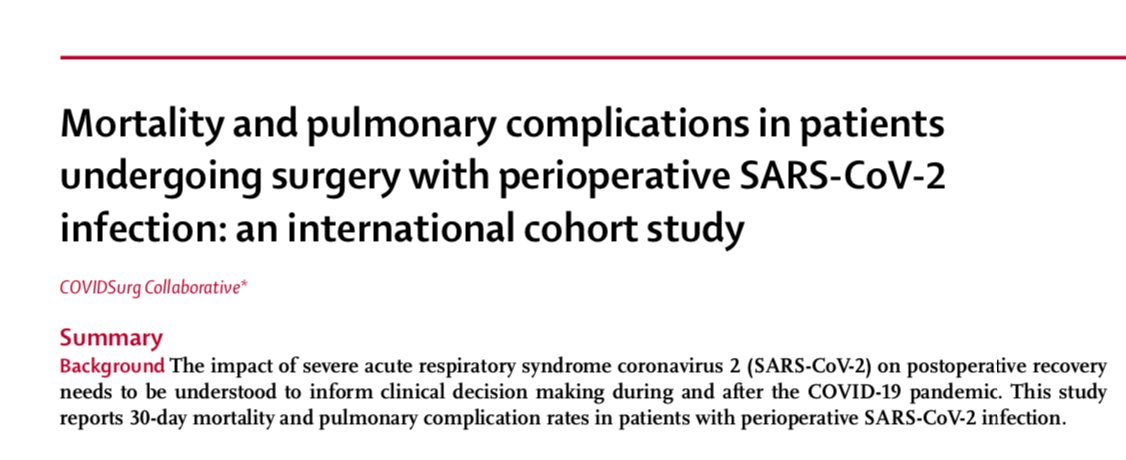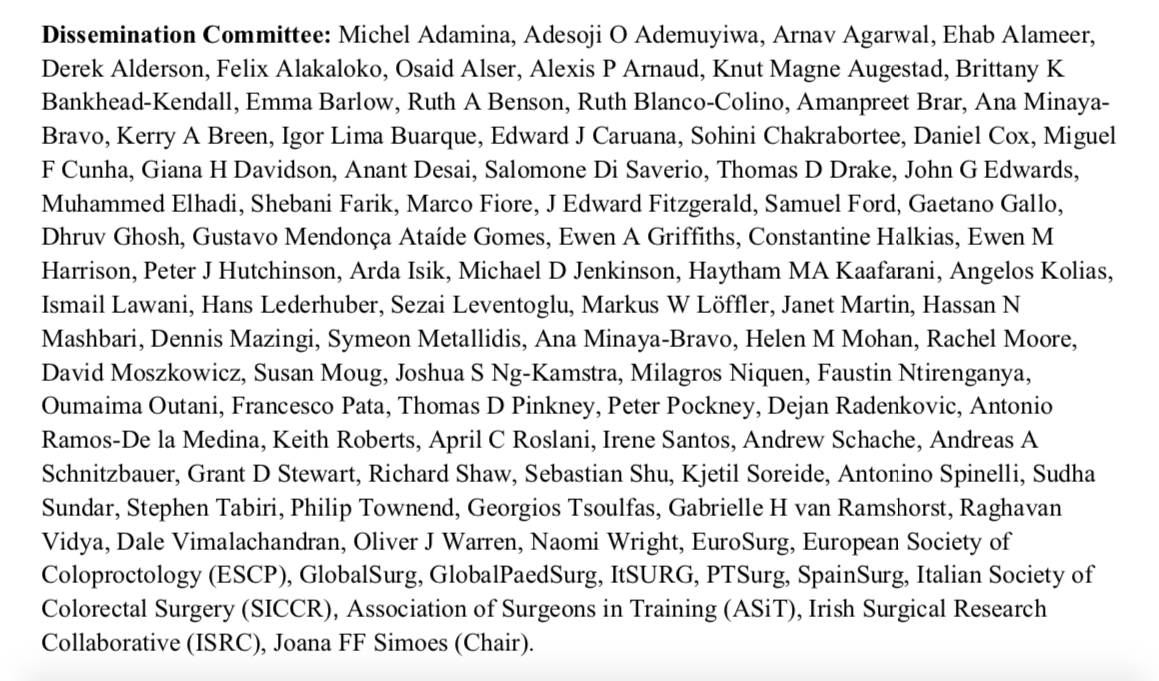The Editor's Choice in today's @TheLancet is the @FalconRct.
FALCON recruited 5,788 patients across 54 hospitals in 🇧🇯🇬🇭🇮🇳🇲🇽🇳🇬🇷🇼🇿🇦
Here's the story of FALCON & its global leaders who, over past 5 years, formed strong multilateral ties & friendships.
thelancet.com/journals/lance…
FALCON recruited 5,788 patients across 54 hospitals in 🇧🇯🇬🇭🇮🇳🇲🇽🇳🇬🇷🇼🇿🇦
Here's the story of FALCON & its global leaders who, over past 5 years, formed strong multilateral ties & friendships.
thelancet.com/journals/lance…

The story of @FalconRct starts with the @GlobalSurg-2 cohort study.
Published in @TheLancetInfDis, this cohort study of 12,539 patients from 343 hospitals in 66 countries found that surgical site infection risk is greatest in low HDI countries.
thelancet.com/action/showPdf…
Published in @TheLancetInfDis, this cohort study of 12,539 patients from 343 hospitals in 66 countries found that surgical site infection risk is greatest in low HDI countries.
thelancet.com/action/showPdf…

Aware of this high global burden of SSI we wanted to improve the evidence base for how to reduce SSI in low/middle income countries (LMICs).
Supported by @wellcometrust-@The_MRC-DFID, exactly 5yr ago, @GlobalSurg-2 global leads gathered in Birmingham, UK to design a global RCT!
Supported by @wellcometrust-@The_MRC-DFID, exactly 5yr ago, @GlobalSurg-2 global leads gathered in Birmingham, UK to design a global RCT!

We carefully reviewed the WHO Global Guidelines for the Prevention of Surgical Site Infection.
Through a Delphi process we selected two interventions recommended in WHO guidelines despite lack of LMIC evidence:
🔸2% alcoholic chlorhex skin prep
🔸Triclosan coated PDS sutures
Through a Delphi process we selected two interventions recommended in WHO guidelines despite lack of LMIC evidence:
🔸2% alcoholic chlorhex skin prep
🔸Triclosan coated PDS sutures

Working collaborative our global collaboration of surgeons + methodologists came up with a trial to test the interventions: a 2x2 factorial trial, stratified by degree of intraoperative contamination.
Sample size ambitious!
Trial protocol @ColorectalDis: onlinelibrary.wiley.com/doi/epdf/10.11…

Sample size ambitious!
Trial protocol @ColorectalDis: onlinelibrary.wiley.com/doi/epdf/10.11…


Recruitment to @FalconRct started in Dec 2018 at Hospital Español Veracruz in Mexico, led by Antonio Ramos-De La Medina, @ramosdelamedina.
Below is a photo of @FalconRct trial manager Rachel Lillywhite @RE_Lillywhite & Felicity Brant visiting the @MXSurg team!

Below is a photo of @FalconRct trial manager Rachel Lillywhite @RE_Lillywhite & Felicity Brant visiting the @MXSurg team!


In Dec 2019 Prof Stephen Tabiri (@StephenTabiri4) opened @FalconRct across multiple hospitals in Ghana, including:
🔸Tamale Teaching Hosp
🔸Sunyani Regional Hosp
🔸Komfo Anokye Teaching Hosp
🔸Sandema District Hosp
Ghana Hub Manager @BernardOforiAp1 accompanied Prof Tabiri



🔸Tamale Teaching Hosp
🔸Sunyani Regional Hosp
🔸Komfo Anokye Teaching Hosp
🔸Sandema District Hosp
Ghana Hub Manager @BernardOforiAp1 accompanied Prof Tabiri




In India the @FalconRct was led by Dhruv Ghosh at CMC Ludhiana, with other key leads in India including @pdhaque, @rohinmittal, @philalex7, and, of course, @GlobalSurgeryI1 manager @Atul_Suroy.
9⃣ hospitals in 🇮🇳 participated
Below, @AmandeepMonika following up FALCON patients!

9⃣ hospitals in 🇮🇳 participated
Below, @AmandeepMonika following up FALCON patients!


In Rwanda, Prof Faustin Ntirenganya (@Fostino21) led FALCON across four hospitals.
An amazing total of 902 patients were recruited in Kigali, Kibungo Referral Hospital, Ruhengeri Referral Hospital, and Kibogora Hospital.
Great contribution by JC Allen Ingabire (@ijea2000) also!
An amazing total of 902 patients were recruited in Kigali, Kibungo Referral Hospital, Ruhengeri Referral Hospital, and Kibogora Hospital.
Great contribution by JC Allen Ingabire (@ijea2000) also!

Four hospitals participated in @FalconRct across South Africa led by Rachel Moore (@ladysurgeonsa) and the South Africa Hub Manager Ncamsile Nhlabathi (@Ithandile1).
Below: Rachel receives an award at the Annual @Globalsurg 'Oscars' from @ewenharrison. @aneelbhangu in background


Below: Rachel receives an award at the Annual @Globalsurg 'Oscars' from @ewenharrison. @aneelbhangu in background



Ismail Lawani (@lawaniismail) worked extremely hard to get @FalconRct open in Benin.
A total of 145 patients were recruited by four hospitals in Benin.
Below: @lawaniismail receives an award at the Annual @Globalsurg 'Oscars' from @ewenharrison.

A total of 145 patients were recruited by four hospitals in Benin.
Below: @lawaniismail receives an award at the Annual @Globalsurg 'Oscars' from @ewenharrison.


We were constantly inspired by amazing efforts of the @nihr_gsu_lhub team led by Prof Adesoji Ademuyiwa (@Soji_Ademuyiwa) at Lagos University Teaching Hospital.
Prof Ademuyiwa led a collaboration of DOZEN hospitals all across Nigeria!
Together they recruited 2⃣1⃣6⃣5⃣ patients!

Prof Ademuyiwa led a collaboration of DOZEN hospitals all across Nigeria!
Together they recruited 2⃣1⃣6⃣5⃣ patients!


A special mention for Adewale Adisa (@AdewaleAdisa1), @nihr_gsu_lhub Deputy Hub Lead.
At Obafemi Awolowo University Teaching Hospitals Complex Wale recruited 6⃣3⃣9⃣ patients to @FalconRct! Stunning!!
Below: @AdewaleAdisa1 randomising his first patient!
@CatrionaLaing1

At Obafemi Awolowo University Teaching Hospitals Complex Wale recruited 6⃣3⃣9⃣ patients to @FalconRct! Stunning!!
Below: @AdewaleAdisa1 randomising his first patient!
@CatrionaLaing1


Massive efforts also by the @BhamCTU & @NIHR_GSU teams in Birmingham: Trial Managers Rachel Lillywhite (@RE_Lillywhite) & Donna Smith (@smith_dz6); Laura Magill; Felicity Brandt; Sohini Chakrabortee (@SohiniChakrab); statistician Omar Omar (@OmarMOmar15)
@kt2morris



@kt2morris




Also in Birmingham were Professor Dion Morton & Professor Peter Brocklehurst (@brocklehurst_p), @NIHR_GSU directors who constantly unblocked problems and moved things forward.
Many others contributed to @FalconRct over the years- everyone is credited in authorship!
Many others contributed to @FalconRct over the years- everyone is credited in authorship!

Last mention to my best friends @aneelbhangu & @DrJamesGlasbey who I've been lucky to work with over many years now.
James and I learnt massively from Aneel as he led the FALCON from conception to publication.
Photos from Nov 2017 when FALCON protocol was still being finalised!

James and I learnt massively from Aneel as he led the FALCON from conception to publication.
Photos from Nov 2017 when FALCON protocol was still being finalised!


So, exactly 5 years on since @FalconRct collaborators first met (6 Nov 2016), what have we achieved?
1. FALCON @TheLancet results should change WHO guidance; 2% alcoholic chlorhex & triclosan coated PDS do NOT reduce SSI (=health system cost savings)
thelancet.com/journals/lance…
1. FALCON @TheLancet results should change WHO guidance; 2% alcoholic chlorhex & triclosan coated PDS do NOT reduce SSI (=health system cost savings)
thelancet.com/journals/lance…

2. @NIHR_GSU has matured in to a stable platform for delivery of high quality global surgical trials that inform global practice.
Two other trials @CheetahRct & @PenguinRct well under way, with more trials in the pipeline - all co-developed & co-led by global teams.

Two other trials @CheetahRct & @PenguinRct well under way, with more trials in the pipeline - all co-developed & co-led by global teams.


3. Arising from the initial contacts made through the @FalconRct collaboration, extensive South-South & South-North collaborations have developed across a wide range of research, education, and service development initiatives. This enriches everyone.
https://twitter.com/Fostino21/status/1448984055043829763?s=20
4. The importance of investment by @NIHRresearch in strong global collaborations and robust research infrastructure was demonstrated by @NIHR_GSU's rapid launch of @CovidSurg.
@NIHRcommunity have highlighted @CovidSurg as a key pillar of its global response to COVID.
@NIHRcommunity have highlighted @CovidSurg as a key pillar of its global response to COVID.

5. More broadly, @NIHR_GSU exemplified power of global collaboration to effectively tackle common challenges - whether that's postoperative complications like wound infection or pneumonia, or impact of COVID
I hope @NIHRresearch & @LucyChappell2 continue supporting global work.
I hope @NIHRresearch & @LucyChappell2 continue supporting global work.

• • •
Missing some Tweet in this thread? You can try to
force a refresh











